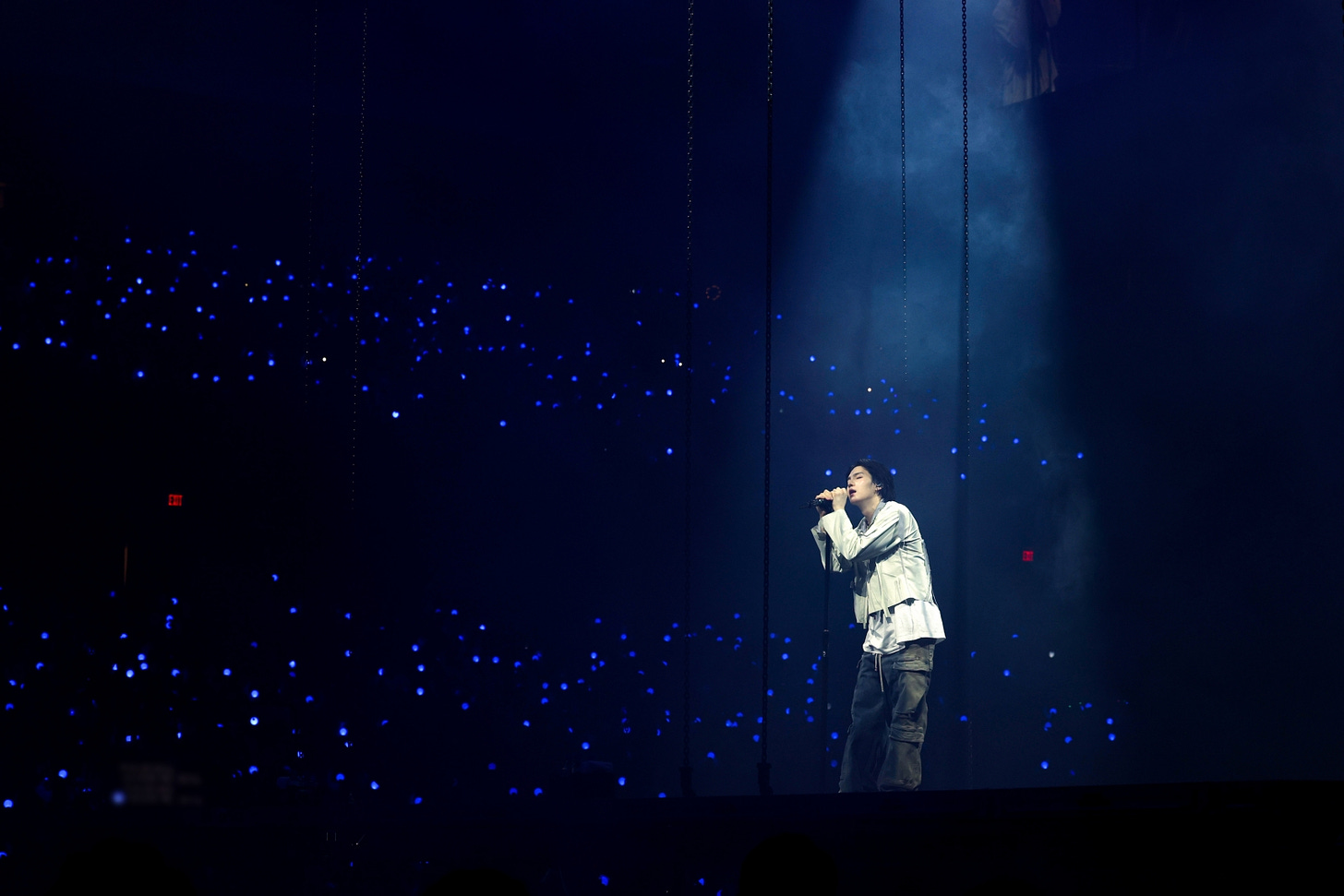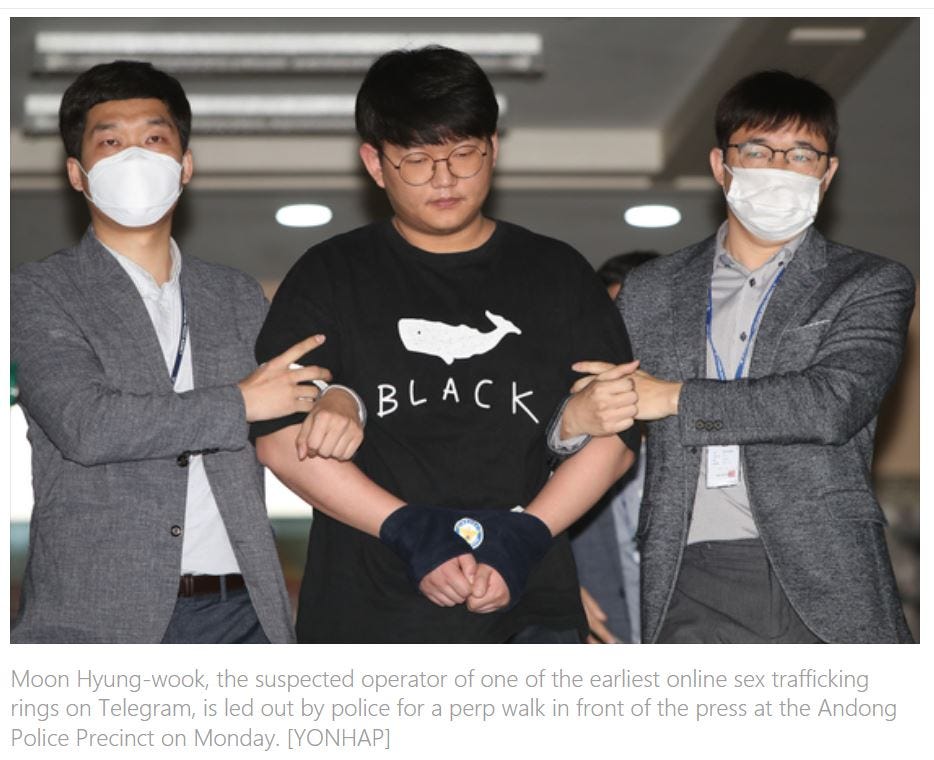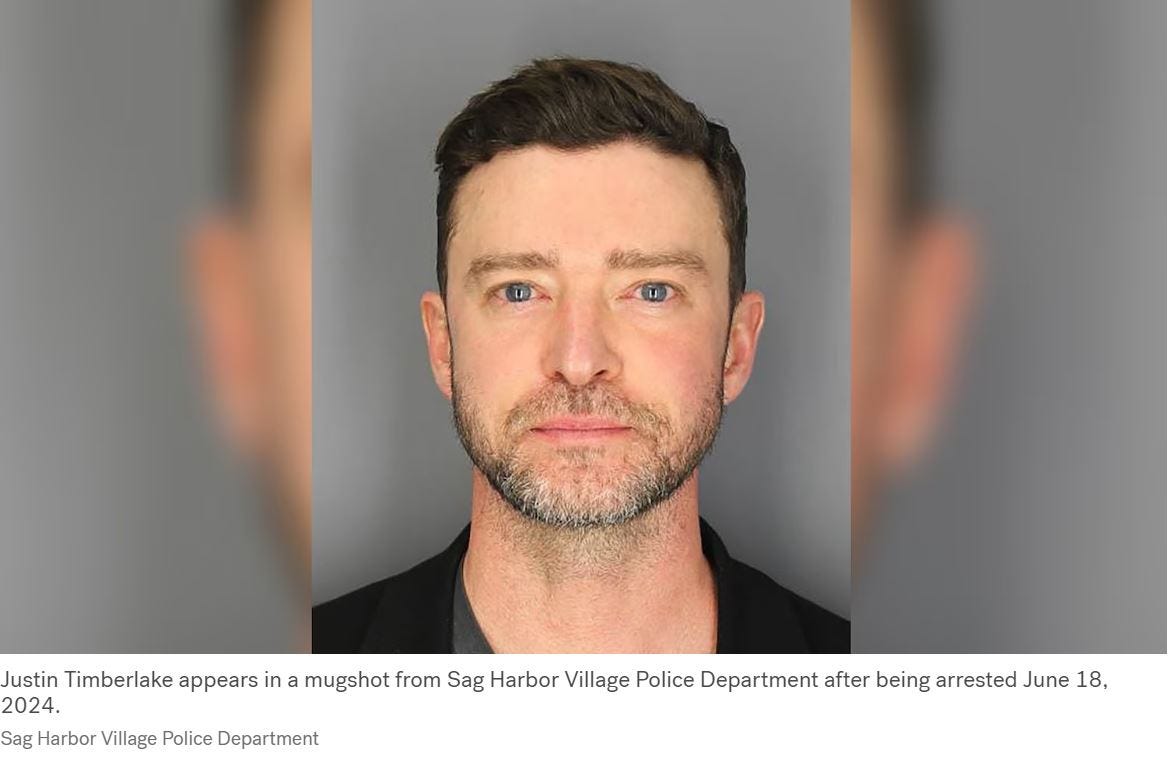By Jae-Ha Kim
Substack
August 24, 2024

[This is a followup to The Sacrificing of Suga, my article from earlier this week.]
On August 23, 2024 (Friday), the BTS rapper, Suga, underwent police questioning. But before he entered the police station, he was made to do the perp walk, stand before the gathered media to have his photo taken and apologize.
The success of the police and the media is heavily dependent upon cooperation even though there is conflict on a regular basis.
Clearly not every Korean who is arrested is subjected to this. It’s usually saved for high-profile criminal cases. After Moon Hyung-wook — the mastermind mind behind the Nth Room — was arrested, more than 2.5 million citizens signed a petition on the presidential website demanding that his identity be disclosed and that he be placed in a press photo line.

[Before reading on, please note this Trigger Warning for sexual abuse and assault.]
Moon’s crimes included:
• Selling graphically obscene images of young women and underage girls.
• Blackmailing his victims to perform gruesome sex acts and self harm themselves.
• Filming co-conspirators raping and torturing female high school students.
• Profiting off his victims by selling their exploited images to his more than 260,000+ subscribers.
By comparison, Suga was subjected to the perp walk because of a DUI and because he’s one of the most famous men in South Korea. But let me remind you of Suga’s crime (which he has admitted to since Day 1):
• Riding an electric motor scooter after drinking with friends at dinner.
• Falling off his scooter hurting no one or harming any physical property.
Did he do something illegal? Yes. According to South Korean law, riding an electric motorbike while legally drunk is categorized as a DUI.
Did he admit his guilt? Yes. Though he said he didn’t realize it was illegal to drink and ride a scooter, he accepted responsibility for it.
Does his case deserve a perp walk? No.
I realize that South Korean and U.S. laws are different. But I also maintain that certain aspects of human rights are universal, or should be. Perp walks/press photo lineups aren’t done because they’re necessary, but because it satiates the public’s prurient interest.
This abstract from the U.S. Department of Justice (titled “Perp Walk: Due Process vs. Freedom of the Press”) states it better than I can:
The perp walk is the act of displaying the alleged perpetrator of a crime so the news media has an opportunity to photograph or videotape the individual for newspapers and television. The perp walk places the accused in both a physical and legal position that appears to belie the presumption of innocence.
The success of the police and the media is heavily dependent upon cooperation even though there is conflict on a regular basis. Police officials are aware that the success of their agency is measured by their ability to solve major cases and by high numbers of arrests. The media are almost completely dependent on the information given to them by the police to feed the public’s appetite for crime news. The perp walk benefits both the police and the media for these reasons.
The most common form of perp walk occurs as police conduct the accused from a vehicle into a police station or courthouse. When the alleged perpetrator of a crime is walked for the benefit of the media, little care is taken to assure his or her safety and well being. In 1999, a New York Federal court judge ruled that a perp walk violated a suspect’s right to privacy. As a result, the New York Police Department no longer routinely advises the news media about opportunities for photographing suspects. Negative media coverage can taint jurors’ perception of the defendant.
For those arrested and paraded before the media, the images of guilt will not be easily erased from the minds of the public. The stigma of criminality remains attached to people accused of criminal wrongdoing long after charges have been dropped or not guilty verdicts have been rendered. Defending the perp walk for purposes of identifying the individual being walked for other crimes is a weak argument and is counter to fairness.
There have been other DUI cases involving South Korean celebrities. Former baseball player Jang Won-sam hit a car that was approaching from behind as he was reversing. “Bloodhounds” actress Kim Sa-ron was cut from the latter part of that K-drama after she was arrested for a DUI. Neither of them received the kind of media attention that Suga is facing, because neither of them is as famous as he is.
So I don’t think it makes much sense to compare his treatment to theirs. Rather, it could be more beneficial to revisit Justin Timberlake’s DWI. Timberlake is a world famous pop star with an enormous amount of fame.

In June, Timberlake was pulled over after leaving a bar in the Hamptons, drove through a stop sign, and swerved into another lane. According to police reports, Timberlake smelled of alcohol, had slurry speech and performed poorly in the field sobriety test. He also refused to take a breathalyzer test. The pop singer admitted he had a drink, but not more than one, and was not drunk.
His mug shot was splashed all over the news and quickly went viral on social media. As with Suga, there was an immense amount of interest in his case.
But just four days after his arrest, Timberlake was back at work. He performed a sold-out concert at Chicago’s United Center, where he joked about his incident. His career is just fine.
Does this mean that Americans are nicer than Koreans? No, of course not.
But I do think that as much of a cesspool as the United States can be, one of the things I appreciate is that Americans don’t care as much about mistakes as Koreans do. Some might argue that having a stronger sense of morals is better and benefits society more as a whole. Others might maintain that given the circumstances, not all crimes are created equal.
If Suga had actually hurt someone while drunk… if he had damaged property… if he had been the cause of anything more than falling off his own scooter… that would be something completely different. That would be news.
This wasn’t a hit-and-run. The only person hurt was himself. But that doesn’t seem to be enough for this ongoing circus. So let’s stop pretending that what’s happening here is normal and should be accepted due to cultural differences. There is room for forgiveness and redemption in every culture.
And finally, some food for thought: I’ve seen quite a bit of social media comments blaming all of South Korea for some news outlets that are doing piss-poor coverage.
Let it be known that I’ve read egregious coverage of politics and pop culture right here in the United States. And while U.S. outlets should be called out for how they present the news, rarely have I seen a South Korean national blaming all of the U.S. for the antics of the Fake News contingent.
* If I have any facts incorrect, please do reach out and I will fix them (and attribute the corrections to you, unless you don’t want to be mentioned). However, it would be helpful if you made the distinction between facts and opinions before pointing out ‘errors.’ Have a great weekend everyone!
ETA: I wanted to wait until we heard back from the police. But my car was rear-ended by an intoxicated, hit-and-run driver this weekend. The police caught her. She was arrested and taken to the police station in handcuffs, before being released until her court date.
She made no apologies. There was no perp walk for her. Though she caused thousands of dollars of damage to my car, I am thankful that she rammed into an automobile instead of a bicyclist, pedestrian or motorcyclist.
© 2024 JAE-HA KIM | All Rights Reserved






2 thoughts on “Suga’s ‘Perp Walk’ Wasn’t Necessary”